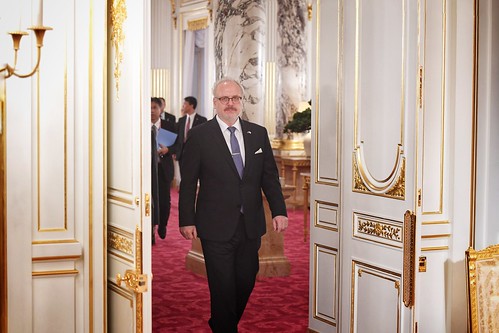President Levits thanked Japanese Prime minister for the opportunity to attend the historic Coronation of His Majesty Emperor Naruhito and Empress Masako and visit of His Majesty Emperor Akihito and Empress Michiko to Latvia in 2007.
Prime Minister Abe thanked Latvia for warm hospitality during his visit in January of 2018, the establishing of Japan-Baltic Cooperation Dialogue and its second meeting in Riga this September. The President and the Prime Minister noted the positive effect of the dialogue on deepening of relations between Japan and Baltic countries.
Egils Levits and Shinzo Abe both underlined that Latvia and Japan are like-minded partners bound by shared values such as democracy, human rights and the rule of law. The President and Prime minister agreed that relations between Latvia and Japan have intensified in recent years. The on-going political dialogue and trade relations have become more active since the exchange of visits to Latvia and Japan by prime ministers. Egils Levits and Shinzo Abe expressed their optimism about the future of dialogue between the two countries.
During the meeting, both leaders praised the excellent relations between the European Union and Japan and impressive leap since the signing of EU-Japan Economic Partnership Agreement and EU-Japan Strategic Partnership Agreement. Shinzo Abe referred to the EU-Asia Connectivity Forum in Brussels in October and the establishment of Partnership on Sustainable Connectivity and Quality Infrastructure between the European Union and Japan as a good platform for further cooperation between Latvia and Japan.
Egils Levits urged Japanese businesses to explore the advantages and opportunities of Latvia's investment climate and open their European headquarters in Riga. Many companies will have to restructure and relocate their business infrastructure after Brexit.
Another focus of the meeting was foreign policy, including regional security challenges in Europe and Asia. The President of Latvia and the Prime Minister stressed the role of multilateralism in today's international relations and the importance of compliance with existing international laws and principles.











